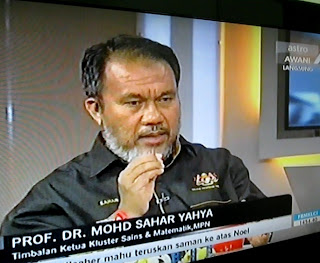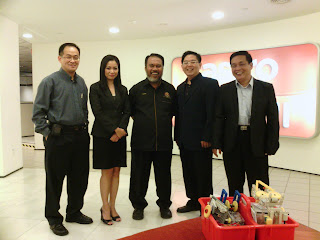Thursday, May 7, 2015
Friday, January 11, 2013
Two New Mighty Science Centres
New Mighty Science centre to serve you KL (DEC 2012) & Penang (Prai) Jan 2013.
Two new Mighty Science centres in (JB & Penang) coming to you in March 2013.
Sorry, school started, busy busy busy... will update the address soon...
Two new Mighty Science centres in (JB & Penang) coming to you in March 2013.
Sorry, school started, busy busy busy... will update the address soon...
Tuesday, October 9, 2012
December 2012 Holiday Programmes
Students not only
learn science principles, but they will create their own science models/robots that move objects,
find their own way around obstacles, respond to light or motion, navigate
through a maze, and even challenge other machines (each student will receive their own sets of science & robotic kits).
Structured lessons and challenges will assist students in intermediate levels of construction, proper use of blocks, motors, IR sensors, and remote control.
Each level allows students to build 10-12 guided
science projects, culminating in a final independent project for
presentation.
Student can sign up for more than one session/week because they will do different projects each session/week.
● TIME: 10 AM - 1 PM or 2 PM - 5 PM (Serangoon Garden Branch / Punggol Branch)
● ROBOT & SCIENCE KITs are included in the course fees.
● Fee S$350 per child.
Learning doesn’t have to stop during school holidays..
Sunday, May 13, 2012
We are what we experience
Author Joseph Epstein stated that "We are what we read."
Neuroscientists would delare instead that “We are what we experience.”
This second statement should drive all activities planned by parents and educators.
Neuroscientists would delare instead that “We are what we experience.”
This second statement should drive all activities planned by parents and educators.
Tuesday, January 3, 2012
Albert Einstein said,
“Learning is experiencing. Everything else is just information,” suggesting that we must “experience” learning by utilizing our twenty or more (not just five) sensory systems. Human beings have an innate need to see, touch, taste, feel, and hear (experience) the features of any new object / subject in order to understand it better.
“Learning is experiencing. Everything else is just information,” suggesting that we must “experience” learning by utilizing our twenty or more (not just five) sensory systems. Human beings have an innate need to see, touch, taste, feel, and hear (experience) the features of any new object / subject in order to understand it better.
Tuesday, November 22, 2011
Live Interview by Astro Awani Channel 501 on 21 Nov 2011 (KL, Malaysia)
We are invited to a live show to show case Mighty Science and Mighty Math programs.
Through our innovative teaching methods, we hope to help students in Malaysia to improve on their UPSR Math & Science scores!
Prof Dr Mohd Sahar Yahya explaining to viewers ways to help students to improve their Science results, including using hands-on Science kits from Mighty Science.
Though I have my fair share of interviews with local media, this is my first time to be interviewed by a foreign media.
Photo taken wth Prof Dr Mohd Sahar Yahya (University of Malaya) at Astro studio
Through our innovative teaching methods, we hope to help students in Malaysia to improve on their UPSR Math & Science scores!
Prof Dr Mohd Sahar Yahya explaining to viewers ways to help students to improve their Science results, including using hands-on Science kits from Mighty Science.
Though I have my fair share of interviews with local media, this is my first time to be interviewed by a foreign media.
Photo taken wth Prof Dr Mohd Sahar Yahya (University of Malaya) at Astro studio
Thursday, October 20, 2011
Why hands-on courses are beneficial for your child.
The Science of Learning
We receive questions frequently about student learning. One question that has been asked several times and in numerous different ways is, "Can you recommend a short list of priorities for learning?" Those items should always include the following:
• Hands-on, minds-on, heart’s-in learning experiences (experiential learning)
• Relevance to the student’s personal life whenever possible (it is relevance that makes "rigor" achievable)
• Active learning, which is how the brain learns best and remembers most effectively (engagement)
• Student-centered learning, which increases the probability of student achievement
• Technology, manipulatives, and simulations followed by student writings on those experiences
• Metacognitive learning where students analyze, reflect on, and discuss their thinking processes
• Differentiated learning, since students learn at different rates and by different means
• Diverse learning styles using multiple intelligences to address the different ways of knowing and different ways of learning
• Build from the concrete experience to the pictorial/representational to the abstract/symbolic
• Provide a physically and emotionally safe learning environment• Build upon past learning and prior knowledge (schemas)
• Learners must apply their learning in order to establish long-lasting neural connections
• Capitalize on a child’s interests and strengths for motivation (requiring “Emotional Intelligence”), while helping a child learn how to “manage” his/her “emerging talents” (a.k.a. "weaknesses") competencies, and skills.
(Article by K. Wesson)
We receive questions frequently about student learning. One question that has been asked several times and in numerous different ways is, "Can you recommend a short list of priorities for learning?" Those items should always include the following:
• Hands-on, minds-on, heart’s-in learning experiences (experiential learning)
• Relevance to the student’s personal life whenever possible (it is relevance that makes "rigor" achievable)
• Active learning, which is how the brain learns best and remembers most effectively (engagement)
• Student-centered learning, which increases the probability of student achievement
• Technology, manipulatives, and simulations followed by student writings on those experiences
• Metacognitive learning where students analyze, reflect on, and discuss their thinking processes
• Differentiated learning, since students learn at different rates and by different means
• Diverse learning styles using multiple intelligences to address the different ways of knowing and different ways of learning
• Build from the concrete experience to the pictorial/representational to the abstract/symbolic
• Provide a physically and emotionally safe learning environment• Build upon past learning and prior knowledge (schemas)
• Learners must apply their learning in order to establish long-lasting neural connections
• Capitalize on a child’s interests and strengths for motivation (requiring “Emotional Intelligence”), while helping a child learn how to “manage” his/her “emerging talents” (a.k.a. "weaknesses") competencies, and skills.
(Article by K. Wesson)
Subscribe to:
Posts (Atom)



